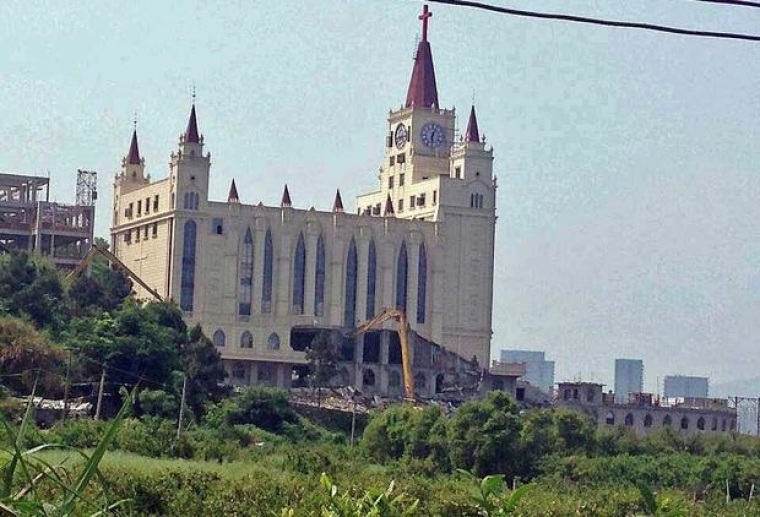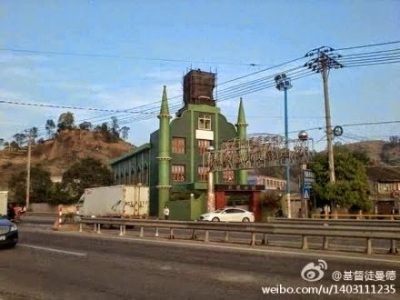China's crackdown surprised some churches building 'grander' facilities

SHANGHAI (Christian Examiner) – An urban planner of Chinese ancestry visited his homeland last spring just as reports began to appear worldwide that officials in Zhejiang Province south of Shanghai removing crosses from churches and in some cases demolishing entire buildings.
To date, 426 churches have been targeted, according to China Aid, a Texas non-profit. In many cases, only the cross was removed; in others, entire structures were destroyed.

"In China, the local officials who are responsible to implement government regulations have a lot of leeway," said Chung Li, who travels to China each spring, sometimes more. "They can clamp down harder depending on the situation. ... I have checked with other provinces and there is no such [tearing down churches] policy going on."
During his visit last year, Li talked with urban planners and building officials in Zhejiang Province.
"Before the whole incident [about Sanjiang Church] came out I was talking to an architect friend who is knowledgeable of the situation in Yongjia," Li told the Christian Examiner.
Li's friend had been working with the city about the church building. The firm he worked for had been given the task of resolving objections and redesigning the parts of the church that were found to be in violation of local codes.
"That was going on until the church was abruptly torn down," Li continued. "Everything stopped; no more negotiation."
Li was in China long enough to gain a broad perspective of the situation.
"You have to put it in wider context," the U.S.-based urban planner said. "As far as I know, the [province] is clamping down on all illegal structures. ... Some of these were built without permit, going against any land use policies or building regulations."
Agricultural land is at a premium in China, Li said. The new homes, businesses, churches and other institutional buildings encroaching on agricultural land illegally are the majority of the structures being demolished.
"The churches affected are a small portion of the whole effort," Li said. "I was told there were private development, Buddhist temples, and other institutional buildings as well as the private homes of officials that were torn down because they did not have the proper permits."
One of the early church buildings torn down had a permit, but they exceeded it in two ways, Li explained. They built the meeting hall—worship center—much bigger and taller than was allowed on the permit, and an auxiliary building permitted for three stories was built seven stories high.
The Drum Tower Church in Hangzhou was another notable case that received much attention outside China, Li said. This cathedral-size church was actually designed and built by the city government to replace an earlier structure which was torn down to make way for a freeway. There were permits, but somehow it was discovered that the cross was constructed bigger than what was recorded on the approved construction documents. Therefore it is, strictly speaking, illegal and was torn down in spite of objections from the church.
"The real problem might be that it was too prominent and could be seen from all the nearby freeways," Li suggested.
As an urban planner, he is in favor of efforts for the government to enforce laws and regulations to ensure orderly use and development of land and buildings that benefit the community, Li said. But past errors could not be corrected overnight.
"In other [provinces], the government took much effort and time to allow an orderly transition to full enforcement of land use and building laws," Li said. "It is hard to understand why the Zhejiang party leader wanted to enforce these laws and regulations so suddenly and so strictly with no time for an orderly transition.
"I was told that the State Administration for Religious Affairs (SARA) had sent a team to Zhejiang to investigate," Li continued. "Apparently the Beijing administration is not really behind the whole church-demolishing effort in Zhejiang and is concerned about the attention it had raised in China and overseas, as well as on the hardship to the Christian community."
Many more church buildings and crosses were torn down after the meeting, Li said, which indicated to him that SARA's concern had no impact on the local government.
"All this makes one wonder that the party leaders in Zhejiang seemed to be more concerned about the growth of Christian churches in number and in prominence," Li said.
Historically Christianity had a prominent presence in Zhejiang and the Christian community had been growing rapidly after the relaxation on religious belief restrictions after the Cultural Revolution. Christianity grew especially fast in Wenzhou, so much so that it has become known as the Jerusalem of China because of its many churches.
"This region is one of the most prosperous regions in China," Li said. "Local congregations used their wealth to build bigger and bigger churches, sometimes in close proximity to each other."
With the government enforcement of land use laws and building regulations being so relaxed, congregations tended to build bigger and grander, as if to compete with each other with little regard to follow laws and regulations, Li suggested.
"In this crackdown, both the churches and the government are in the wrong," Li said. "To be fair, the government has the legal right as well as the responsibility to enforce the laws of the land. Churches, like any other buildings, have to suffer the consequence of being torn down if they violate any law or regulation.
"The situation in Wenzhou indicates a deeper problem; in their misguided ways, local congregations competed with each other to build bigger and grander to show the whole world that God is blessing them. The churches need to learn that this goes against Christ's example of humility and teaching of respect to the laws of the land."
However, even though the government has the right to enforce laws, its actions brought undue hardship to the community, especially to Christian churches.
"Officials knowingly neglected that it needs time and transitional efforts to bring about change to a society in which law enforcement had been too relaxed or even ignored, to one where there is strict and fair enforcement," Li said. "This callous neglect leaves open the question: Is there another motive behind the crackdown and is it the beginning of harsher treatment on the faith in the whole country?"